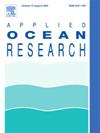Cooperative event-triggered control for the multi-USVs via the formation reconstruction
IF 4.3
2区 工程技术
Q1 ENGINEERING, OCEAN
引用次数: 0
Abstract
In this paper, a robust neural cooperative path following control algorithm is designed for multi-unmanned surface vehicles (USVs) to address the problems of the wreck avoidance by an utilization of the formation reconstruction mechanism and event-triggered rule. For this purpose, an artificial potential field (APF) guidance principle is developed, where can guide a local avoidance obstacle effect without affecting the global path following operation by designing a formation reconstruction mechanism. The major feature is that the problems of the local minimum and unattainable destination for the traditional APF are settled by presenting a velocity coordination strategy, ensuring a cooperative performance of the USVs while encountering the wreck obstacles. For the control module, a novel dynamic event-triggered rule is proposed by introducing a feedback function of output error, which can avoid the restriction of the fixed threshold parameters. Owning to this merit, the actuation frequency of the control law and adaptive neural parameter is reduced for saving a limited transmission resource usage. Further, the actuator failures caused by the potential factors, see for example saturation, delay and hysteresis are discussed by employing the two adaptive law, where the unknown gain-functions are free.
求助全文
约1分钟内获得全文
求助全文
来源期刊

Applied Ocean Research
地学-工程:大洋
CiteScore
8.70
自引率
7.00%
发文量
316
审稿时长
59 days
期刊介绍:
The aim of Applied Ocean Research is to encourage the submission of papers that advance the state of knowledge in a range of topics relevant to ocean engineering.
 求助内容:
求助内容: 应助结果提醒方式:
应助结果提醒方式:


